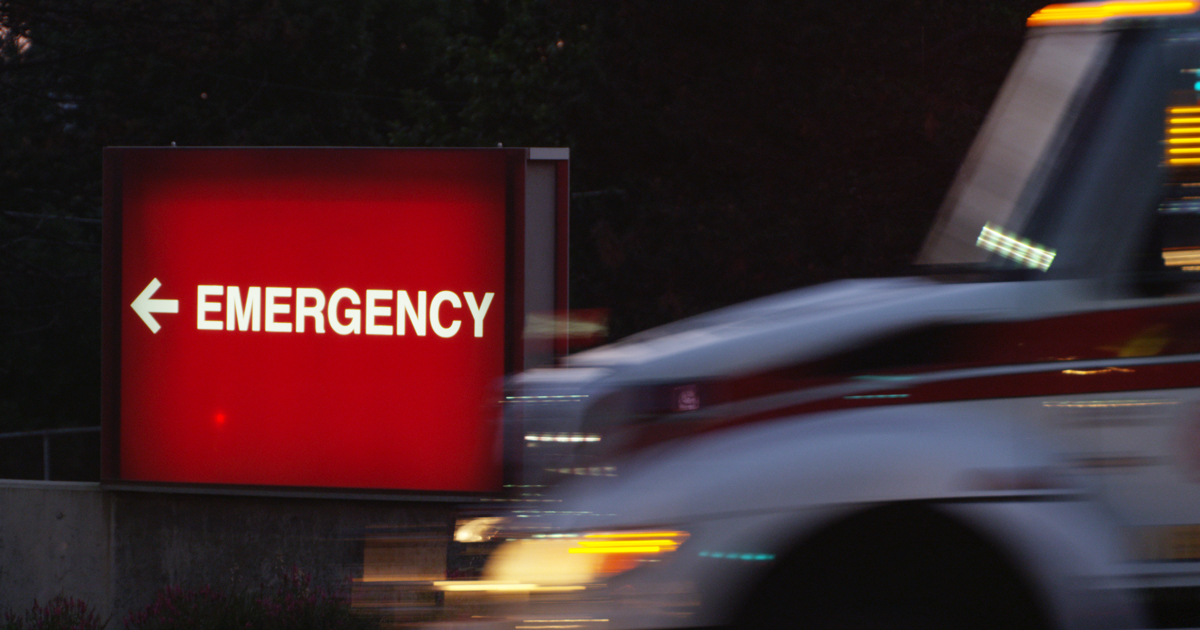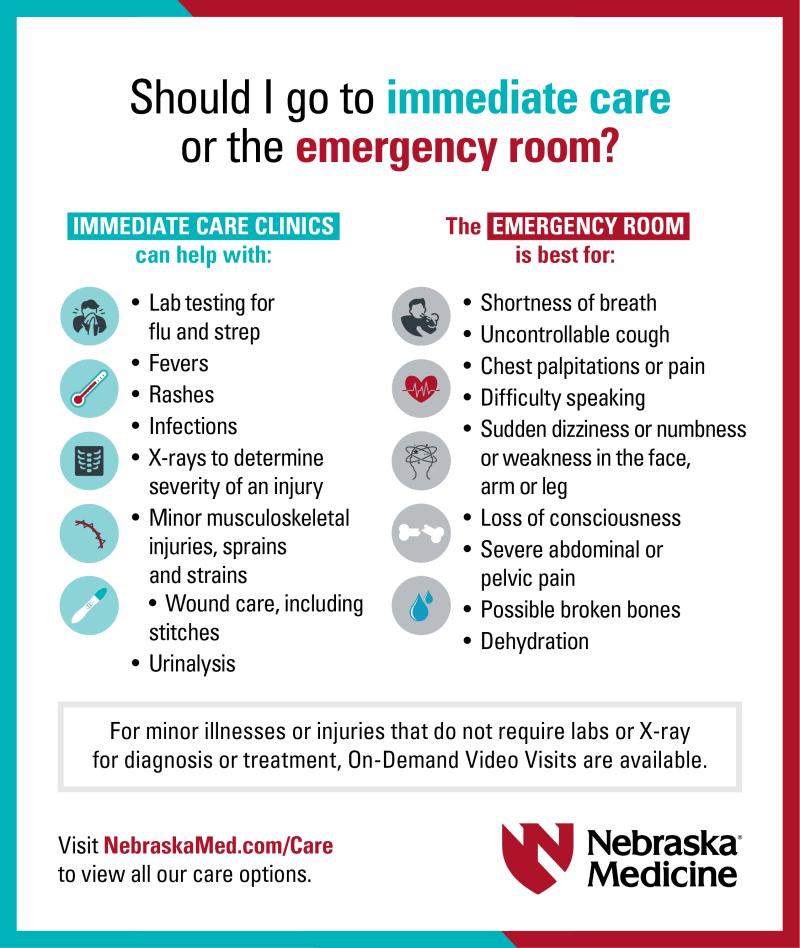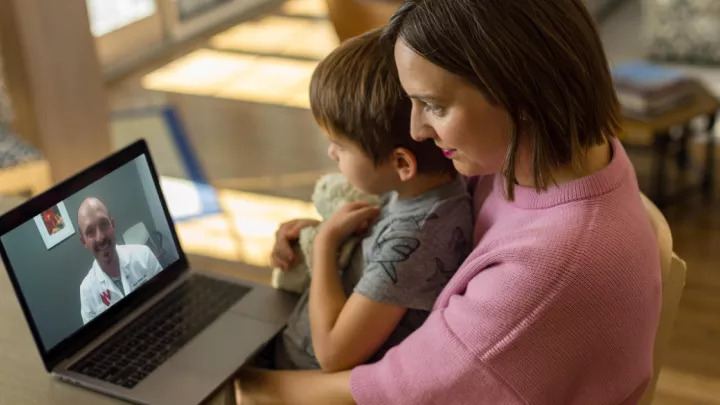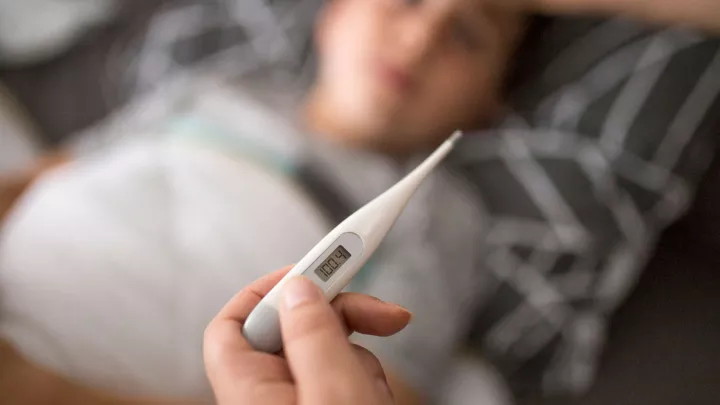Where to go for emergency medical care

When you or a loved one are sick, it can be confusing to know where to go.
Ask yourself:
- Can my situation wait 3 to 5 days? If yes, make a primary care appointment.
- Does it need to be taken care of today? If yes, go to an Immediate Care Clinic or start an Immediate Care Video Visit.
- Is this situation a medical emergency? If yes, go to the emergency department.
Whether you're a current or a new Nebraska Medicine patient, you can go here to find care now.
“If it is not a life-threatening situation, I recommend you talk to your primary care provider’s office as no one knows you better than your patient-centered medical home,” says Stephen Mohring, MD, Nebraska Medicine internal medicine physician. “They will be familiar with your medical history and may be able to provide you with the medical help you need or can direct you to the most appropriate care center.”
If it is after hours and you cannot reach your primary care doctor, you may want to consider one of the Nebraska Medicine Immediate Care Clinics for minor illnesses and injuries. In most cases, you won’t have the long wait times of an emergency room, and your visit is billed as a regular doctor visit. In addition, no appointment is needed, and most clinics are open evenings, weekends and holidays.
"Immediate Care Clinics see patients 6 months and older. If a child is less than 6 months old and needs urgent care, we recommend taking them to an emergency room,” says Dr. Mohring.
At both the emergency room and our Immediate Care Clinics, you will receive care from trained, licensed medical providers, including physicians, physician assistants and nurse practitioners, notes Dr. Mohring.
A visit to an emergency room should be reserved for more severe or acute illnesses and injuries such as chest pain, difficulty breathing or fractures with bones showing.
On the other hand, Immediate Care Clinics are designed to handle less urgent problems, such as colds, most fevers, flu, rashes and infections. The clinics can also perform X-rays to determine the severity of an injury, basic lab tests, flu vaccinations, pregnancy tests and urinalysis. Doctors can provide wound care and stitches and can treat sprains and provide splint care for some broken bones.
Review the guide below to help you determine the most appropriate care facility.
When to go to immediate care:
- Common respiratory illnesses such as colds, flu or sore throat
- Migraines
- Rashes
- Low-grade fevers
- Minor injuries such as sprains, fractures, splint care for broken bones, back pain or minor injuries
- Wound care and stitches for injuries that require more than a bandage
- If you require X-rays to determine the severity of an injury
- Basic lab testing to help diagnose medical conditions such as strep screens, blood work analysis, pregnancy tests, urinalysis and more
Immediate care does not replace emergency care. Those with severe symptoms will be directed to an emergency room.
When to go to an emergency room or call 911:
- Chest pain or irregular heartbeat
- Severe difficulty breathing or shortness of breath
- Severe abdominal or pelvic pain
- Deep cuts or wounds that won’t stop bleeding
- Suspected major bone fracture
- Dehydration
- Gunshot wounds
- Infants under 6 months requiring care
- Pregnant with abdominal pain or bleeding
- Loss of consciousness
- Difficulty speaking, sudden dizziness or numbness or weakness in the face, arm or leg
Looking for an Immediate Care Clinic?
We have clinics at Chalco Health Center, Bellevue Health Center, Eagle Run Health Center, Fontenelle Health Center, Midtown Health Center and Plattsmouth. Find an Immediate Care Clinic near you.
What do I do if I have cold and flu symptoms?
If you have a sore throat, cough, fever, muscle aches or any other cold and flu symptoms, stay home and keep your distance from others. Call your doctor's office to make an appointment.
What is a medical emergency?
We are always here for you if you have an emergency, but we ask that you reserve the emergency room for medical emergencies. For examples of emergencies, see the infographic.
If you don't have a primary care doctor and you'd like to establish care with one, call 800.922.000 to make an appointment.








